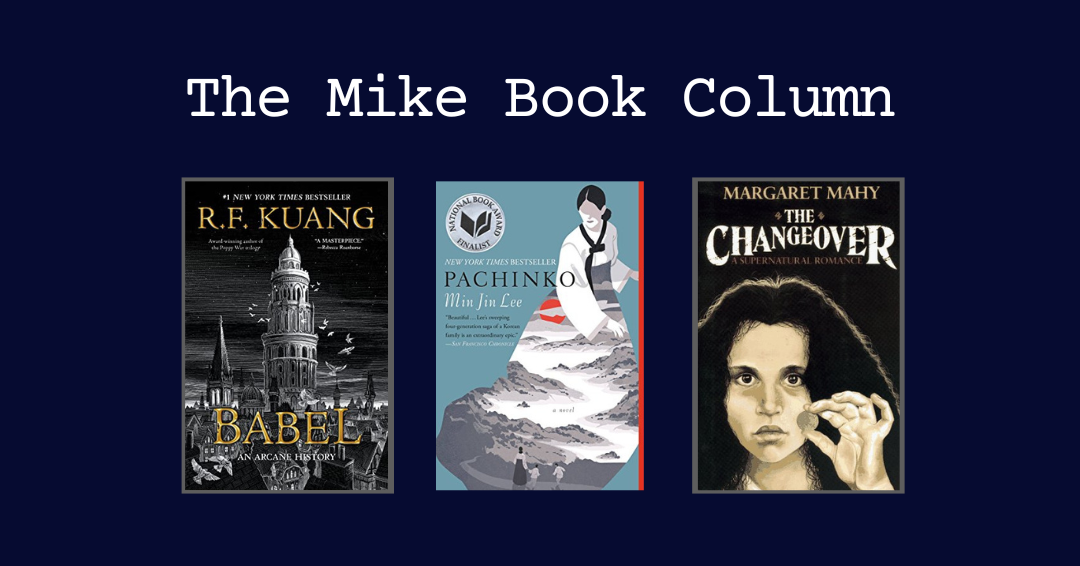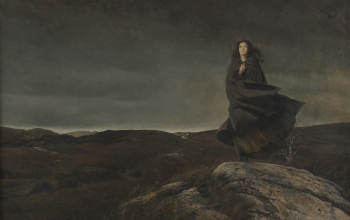Photo Credit: Julliana Santos, Managing Editor
Babel: Or the Necessity of Violence: An Arcane History of the Oxford Translators’ Revolution
– by R.F. Kuang
Madelaine Chrisanthidis, Contributor
I bought Babel on a whim because it was 40% off at Indigo and had a beautiful, gold-leaf dust jacket. After devouring it in a week, I can honestly say that it is the best new release of 2022. The story follows Robin Swift, a Cantonese orphan who gets adopted by a wealthy English Oxford professor. Robin goes to Oxford to study at Babel, Oxford’s Royal Institute of Translation and the world’s magical center. As he navigates his life as a Chinese boy in 1820s Oxford, Robin finds himself torn between the allure of prestigious academic power and his loyalty to his home country.
Kuang excels at challenging the dominant, pro-academic narrative of the dark academia genre. She immerses her reader in a complex, beautifully written world that is equal parts approachable and academic. The reader traverses Oxford with a parallel naivety to Robin, learning alongside him and his friends. Kuang’s use of metatextual elements only heightens the immersion. I would advise any new reader to pay close attention to the footnotes and appendix — there’s more to them than you think!
At a size of about 550 pages, Babel is not a convenient subway-ride book, but it is a great novel to dedicate a rainy afternoon to. Judging by Kuang’s track record, Babel looks to be the first of a new series from her. I look forward to the promising direction that Kuang’s writing is taking; her talent for creating captivating, well-researched historical fantasy epics is clear.
Pachinko – by Min Jin Lee
Angelin Thipahar, Contributor
“We cannot help but be interested in the stories of people that history pushes aside so thoughtlessly.”
– Min Jin Lee
As someone who is eternally fascinated by historical fiction, this quote in Pachinko did resonate with me quite strongly. Pachinko is a complex story of a family struggling to find and preserve their identity amid the oppression they face living in a Japan-occupied Korea. Min Jin Lee weaves together this tapestry of a story spanning generations that really highlights how suffering can bind people together, for better or for worse.
Perhaps in line with the aforementioned quote, the focal point of this novel, simply put, is the legacy of the matriarchs of the family. We celebrate the women in historical texts who have shaken the world with their courage in a tangible, observable way. However, what about those women that did not show their courage with bold expressions of rebellion? This book highlights, in a very honest way, the ability of women to endure above all else and their resilience in the face of difficulty. I really enjoyed the writing style of this book because it details grief, love, and loss so beautifully, yet the language used was very simple and without frills or flourishes.
This story explores intergenerational trauma and the dilemma of finding one’s place in a society that seems split down the middle. The manner in which it is narrated gives you more of an understanding of what it means to grow into adulthood during uncertain times and how you can feel regret and not let it consume you. Overall, I really enjoyed the book and would give it a solid 9/10.
The Changeover – Margaret Mahy
Hamna Ashfaq, Contributor
The Changeover is a unique, intrinsic, poetic narrative that resides in the fantasy and supernatural genre.
The story surrounds Lura Chant — a “sensitive” teen who gets warnings from a supernatural source about imminent incidents. She lives with her single mother and younger brother and recognizes that a senior in her school, Sorenson, or Sorry, is a witch. One day, her brother gets possessed by an ominously creepy store owner, Carmody Braque, and eventually becomes terminally ill. With the help of Sorry and his witch mother/grandmother, Laura discovers a way to cure her brother. By doing a changeover, a ritual, she transitions from a sensitive to a witch, captures Barque, and heals her brother. The book moves towards a resolution with a promise of a reunion for the characters.
This book takes the fantasy genre on a refreshing ride, turning the life of a teen into self-discovery and transitions of supernatural beings. Mahy’s eloquent diction and narration style grip the readers’ attention from the very beginning as it describes and explores a small urban New Zealand community set in a normal supernatural and mystical place. The characters’ chemistry with each other, the meaning of powers given to Laura and Sorry, and the way they are used, all entice the reader to wonder the “what if” and “how” questions. From Sorry’s sexy persona to Laura’s nonchalant and brave outlook on her surroundings, the characters develop with the plot, Laura and Sorry come to terms with each other, and they grow into mature and organic characters. Nothing about this text sounds redundant.
I loved how Mahy used the setting of the novel as a respective character, adding depth to Sorry and Laura via their connection with nature and emotions. The text encapsulates the many aspects of being a teen in this world and what it means to be attuned to one’s inner self.
I recommend this to anyone looking for a fresh, fantasy, supernatural, coming-of-age novel.




